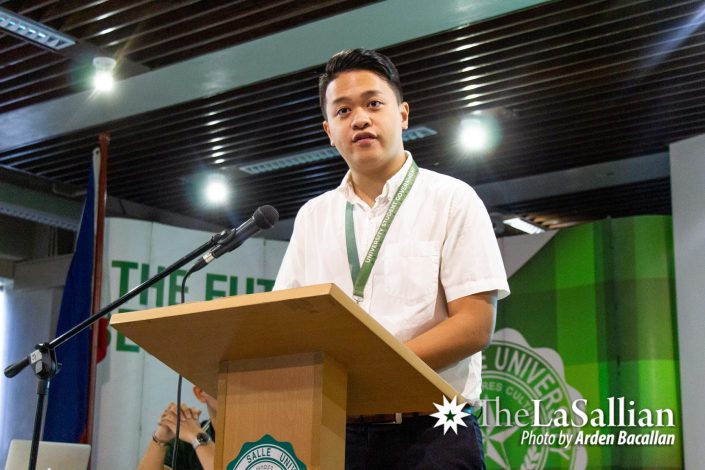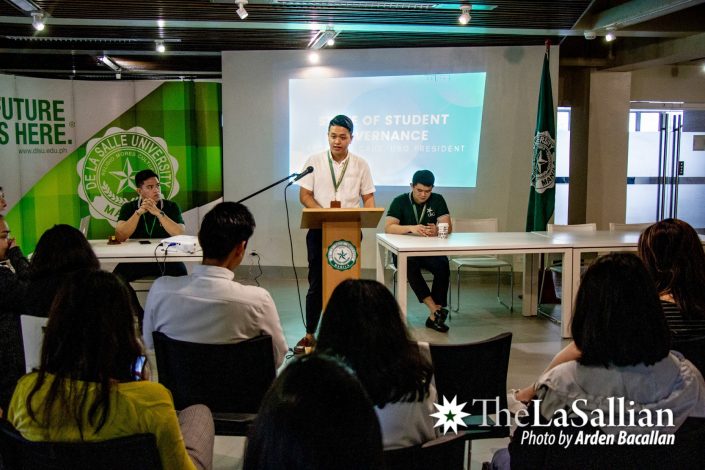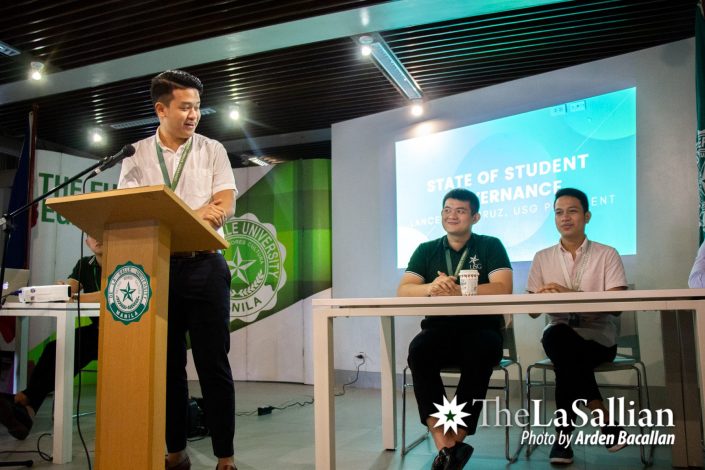The University Student Government (USG) held its first State of Student Governance (SSG) last November 29 at the USG Office in Br. Connon Hall. USG President Lance Dela Cruz led the address, reviewing the USG’s accomplishments during the first term of the academic year and outlining future plans and projects. Dela Cruz highlighted the necessity of the program, saying, “Our constitution mandates that every term, the [USG] president gives a report on the state of our governance.”
In a Legislative Assembly (LA) session last November 15, Office of the President (OPRES) Executive Director for Operations Sam Mamuric explained that “The aim of the [SSG] is to increase student transparency—as well as accountability—so that students may be informed of the activities of the USG units.”

Highlighting achievements
In his speech, Dela Cruz described the state of the student government when he took office—confronted by problems such as vacant seats and “disheartened” student leaders. However, he assured that after one term, the “worst has passed.”
Listing down the accomplishments of USG units, Dela Cruz began by praising the Arts College Government for their wave of fundraising initiatives, thesis grant programs, and data gathering efforts in support of gender equality.
Moving on to the Business College Government, Dela Cruz lauded the efforts made by the unit to fix the flowcharts for ID 118 and 119 students, and to offer new grants for business students, which he mentioned would be available next term.
For the Engineering College Government, Dela Cruz recognized the unit’s initiatives toward better addressing student concerns, such as a frosh welcoming project as well as an engineering calendar and website, both launched this term.
Calling climate change “the biggest challenge of humanity in our generation,” Dela Cruz commended the Science College Government’s (SCG) role in organizing seminars on environmental sustainability. In addition, he acknowledged the SCG’s role in inviting the National Aeronautics and Space Administration team to DLSU in a series of activities in October and November.
Dela Cruz also expressed his appreciation for programs spearheaded by the School of Economics Government. These included lectures by Banko Sentral ng Pilipinas and college subsidies meant to reduce costs incurred by students in doing research.
Dela Cruz also delved into ONE CCS, an initiative to unify the College of Computer Studies’ student organizations and government. He noted the endeavor’s significance in promoting students’ perspectives, talents, and skills. Moreover, Dela Cruz introduced the Computer Studies Government’s upcoming project called the E-Waste program, a month-long recycling project for electronic parts held in partnership with the OPRES.

The College Government of Education also received the USG president’s commendation for their partnership with Teach for the Philippines, an organization committed to giving accessible quality education for Filipino children. The collaboration involved Lasallian students in promoting the advocacy for education equality through a seminar.
For the Laguna Campus, Dela Cruz emphasized the need for a specialized student government for the Laguna extension. He thus hailed the LA’s passing of measures giving the campus more rights and powers to govern itself.
On the role of the Judiciary branch, Dela Cruz restated the importance of checks and balances. Congratulating the appointment of the new Chief Magistrate Clifford Martinez, Dela Cruz expressed confidence in the power of the Judiciary to hold USG officers accountable.
Following the conclusion of the Special Elections, Dela Cruz congratulated the DLSU Commision on Elections (COMELEC) for their role in a successful electoral period, as elections for all remaining seats had been validated. He also mentioned plans by COMELEC to begin automated electronic voting within the next few terms.
Finally, Dela Cruz looked back on the campaign promise of increasing the efficiency for funding the activities of student organizations. According to Dela Cruz, all transactions below P50,000 will now go through a shorter process, and the allowable petty cash will be increased to P7,000, in contrast to the meager P3,000 before.

Looking forward
With two more terms to go, Dela Cruz outlined what students can further expect, including an expansion of the USG’s scholarship programs and fundraising activities through bazaars. Furthermore, Dela Cruz announced that with the passing of the USG constitutional amendments, preparations for a plebiscite can finally begin—the last step in finalizing the new constitution.
In the coming term, the USG would be coordinating with the Multi Sectoral Consultative Committee on Tuition Fees, as Dela Cruz revealed. In addition, a transparency report on USG officers, which includes details on attendance and other items, would be issued some time next term.
Concluding his address, Dela Cruz doubled down on key advocacies of the USG: the urgent need for an accredited LGBTQ+ organization; and a series of efforts to decrease plastic use in the University, in partnership with the Campus Sustainability Office. Finally, Dela Cruz reminded the audience of the importance of student involvement in the programs of the USG as he ended the first SSG.
